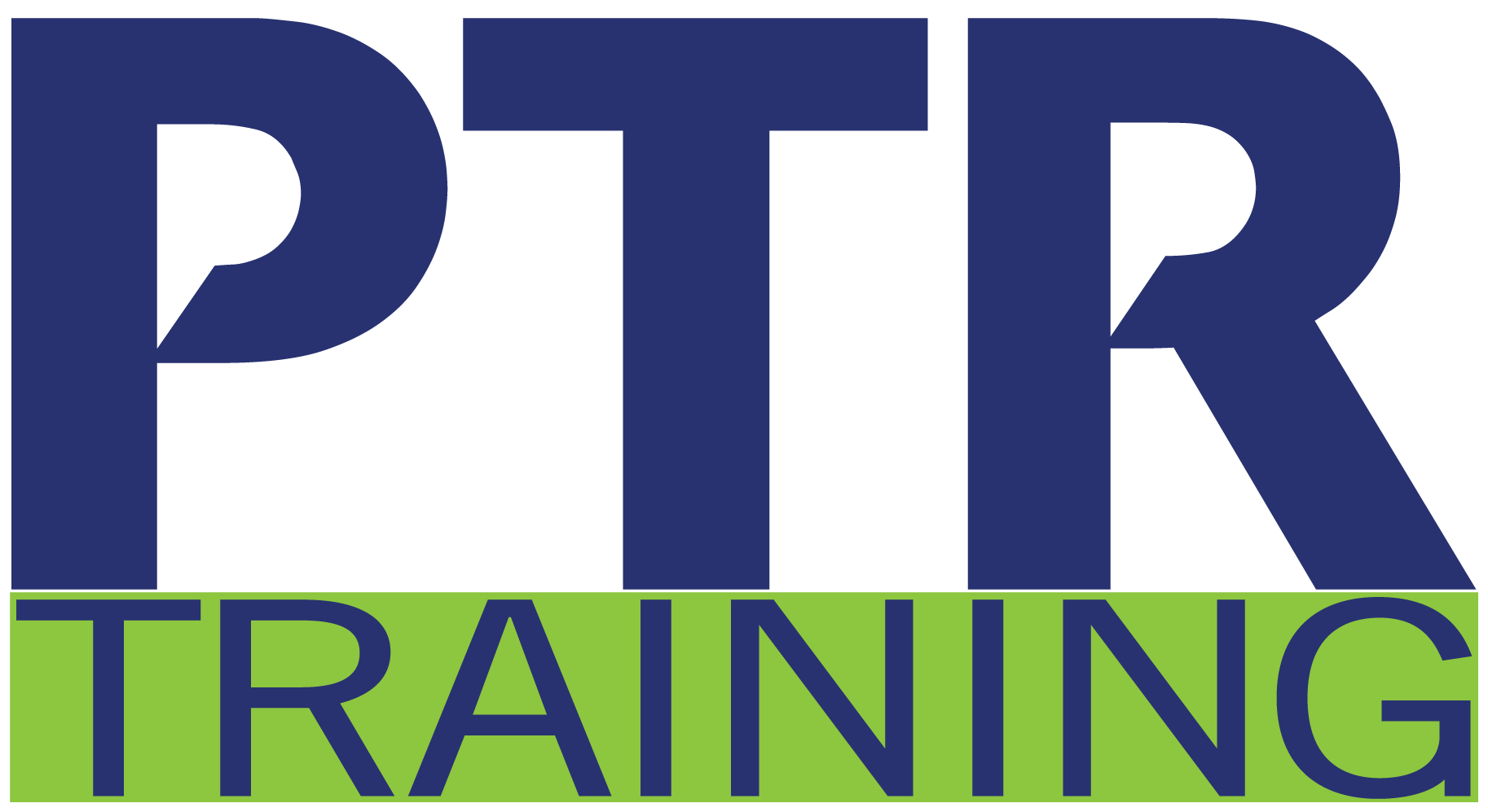The job market is undergoing an unprecedented transformation today. Powerful trends, including technological innovation, demographic shifts, the green energy transition, and global economic uncertainties, are reshaping the availability of jobs and the skills in demand.
The World Economic Forum’s Future of Jobs Report 2025 provides data-driven insights into these changes, highlighting the dynamics of job creation, job displacement, and the skills most critical for the future of work.
Let’s explore the key findings of the WEF Future of Jobs 2025, explain what they mean for today’s job market, and how workers and employers can prepare for the future job market.
Five Key Drivers of Job Market Change
The World Economic Forum Future of Jobs Report 2025 identifies five primary drivers behind global labor market shifts. These forces explain the nature of today’s job market and its trajectory. The WEF survey identifies five key drivers of labor-market change:
- Technological Change – Adoption of AI, robotics, digital platforms, and other emerging technologies is reshaping jobs, automating tasks, and creating new roles.
- Green Transition – Renewable energy projects, sustainability policies, and carbon-reduction efforts are reshaping industries.
- Demographic Shifts – Aging populations are increasing demand for healthcare and care-worker jobs worldwide.
- Geoeconomic Fragmentation – Trade restrictions, industrial policies, and geopolitical tensions are driving reshoring, nearshoring, and increased demand for supply chain and cybersecurity roles.
- Economic Uncertainty – Inflation and financial instability are influencing companies' hiring strategies and the adoption of automation.
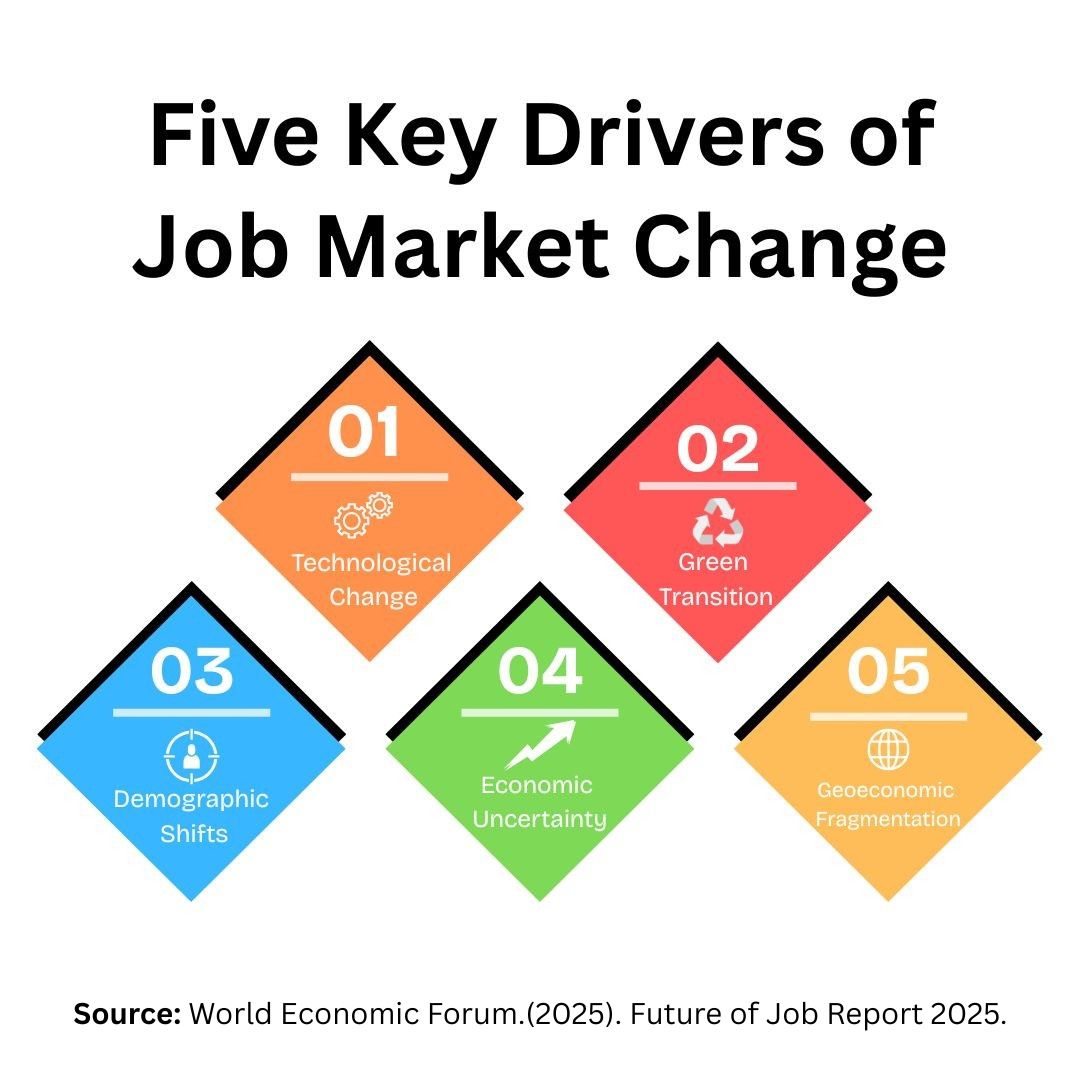
According to the report, broadening digital access is the most influential driver, cited by 60% of employers as a key force shaping business. This confirms that digital transformation is no longer optional—it is redefining today’s job market.
The Technology Transformation
AI and Data as Game-Changers
The report emphasizes that artificial intelligence (AI) and big data technologies are the top disruptors. An extraordinary 86% of employers believe that AI will transform their businesses by 2030.
Additionally, robots and autonomous systems (58%) and new energy-generation/storage technologies (41%) are forecasted to play transformative roles. This highlights how automation and sustainability will dominate the future job market.
By 2030, employers expect nearly equal shares of work tasks to be performed by humans, machines, and a combination of both, highlighting the importance of collaboration rather than pure automation.
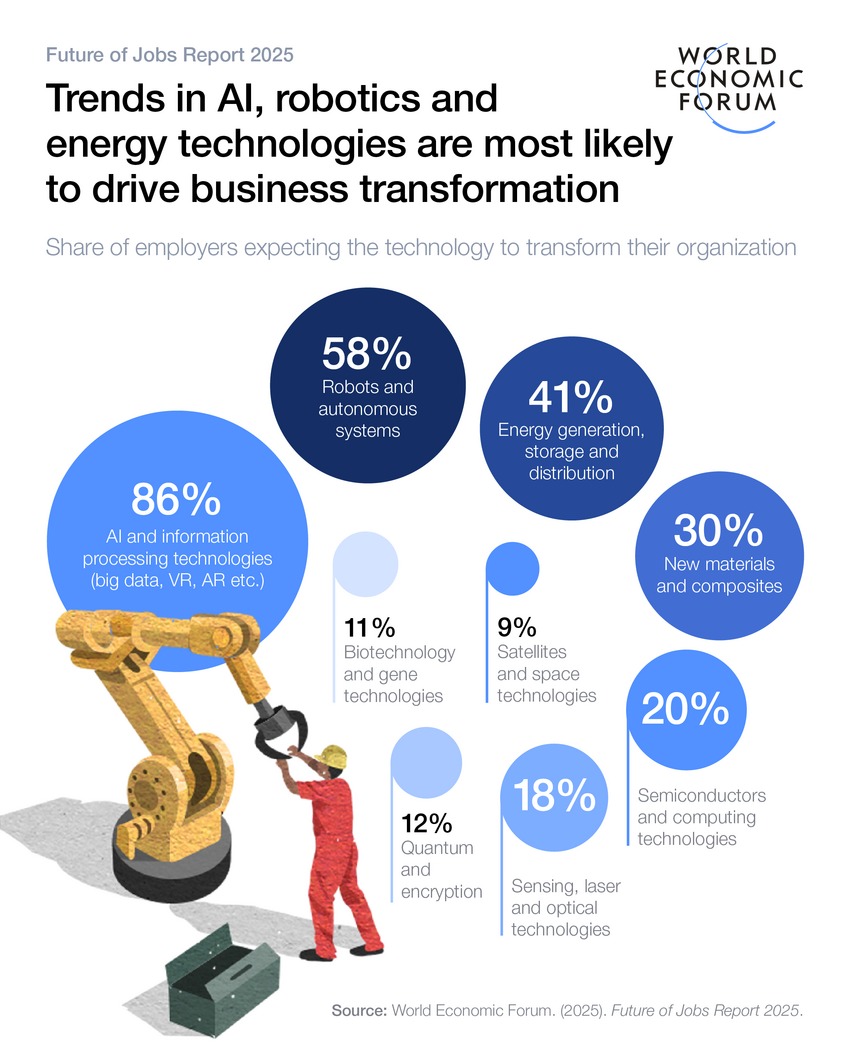
Source: World Economic Forum. The Future of Jobs Report 2025
Generative AI and Upskilling
Generative AI is particularly impactful. Investment in GenAI has increased nearly eightfold since 2022, with the United States and India leading global enrollments in AI training courses. Interestingly, in the U.S., most AI learning is pursued by individuals, whereas in India, it is driven by corporate training programs.
This shows how skills demand varies across regions, yet the global trend is clear: AI proficiency is now a crucial element of job market demand.
The Future Job Market: Growth vs. Decline
The Future of Jobs Report 2025 forecasts both opportunities and risks. Some industries are expanding rapidly, while others face decline.
Net Employment Gains
By 2030, WEF projects approximately:
- 170 million jobs created by technological, environmental, and economic transformations.
- 92 million jobs displaced, primarily in routine and clerical work.
Net growth of ~78 million jobs (a 7% increase in global employment).
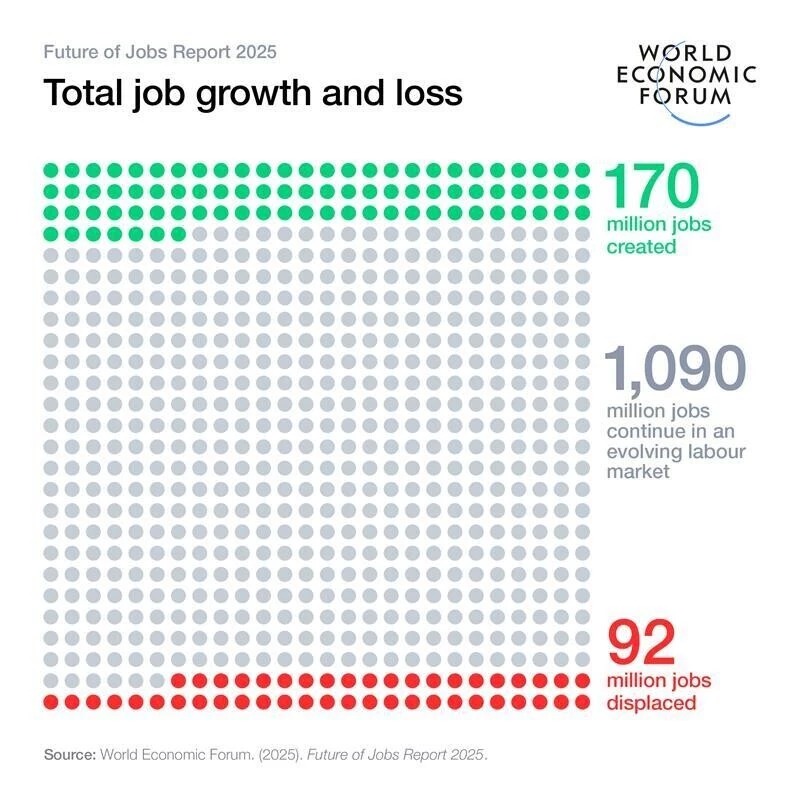
Source: World Economic Forum. The Future of Jobs Report 2025
For context, the U.S. The Bureau of Labor Statistics projects about 5% employment growth between 2022 and 2032, which aligns with the WEF’s global outlook.
While high-income countries face aging populations and workforce shortages, emerging economies like India and Sub-Saharan Africa will contribute the majority of new labor market entrants.
Growing Jobs
The fastest-expanding roles include:
- Tech Occupations: Artificial Intelligence and Machine Learning Specialists, Big Data Analysts, Software Developers, and Fintech Engineers.
- Green Economy Roles: Renewable Energy Engineers and Environmental Specialists.
- Healthcare & Caregiving Roles: Nurses, Personal Care Aides, and Social Workers.
- Education jobs: Teachers and Workplace Training Specialists to support lifelong career development.
Notably, farmworkers top the list in absolute job growth, with a projected 35 million new roles by 2030, fueled by sustainability-driven agricultural reforms.
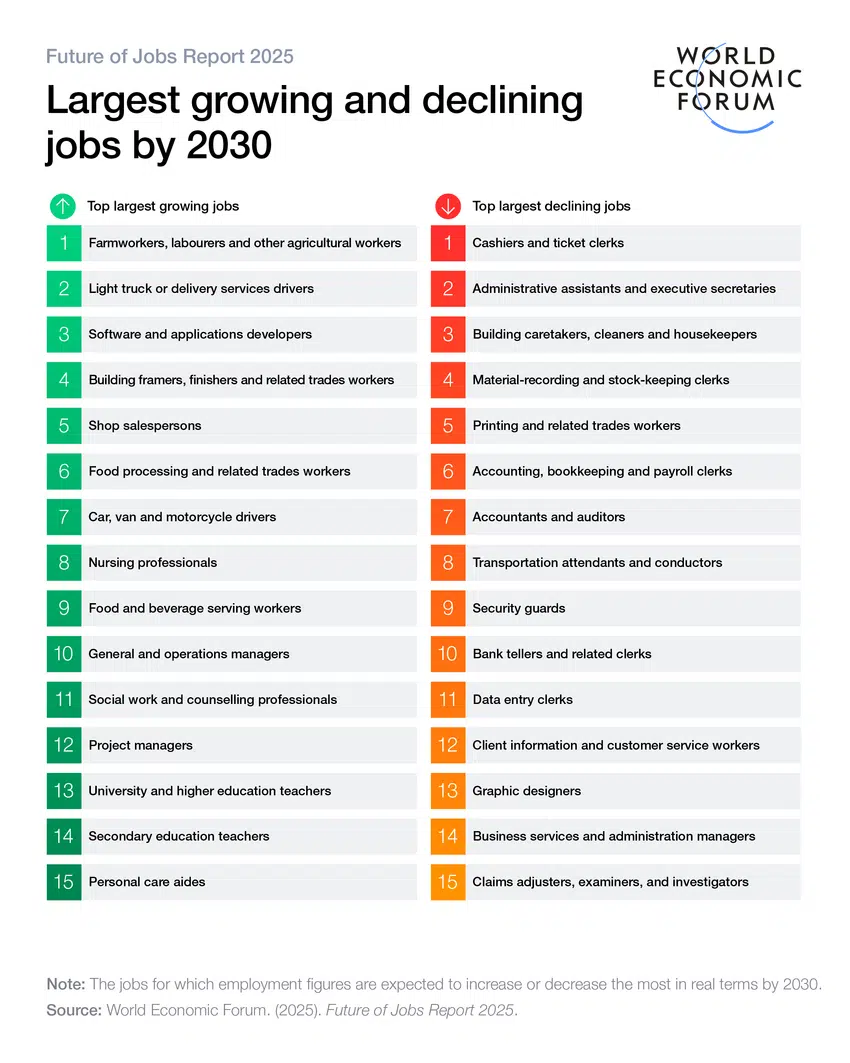
Source: World Economic Forum. The Future of Jobs Report 2025
Declining Jobs
By contrast, jobs expected to decline sharply include:
- Cashiers and Ticket Clerks
- Administrative Assistants
- Printing Workers
- Some Accounting and Auditing roles
The primary cause is automation and digitalization—routine and transactional tasks are increasingly handled by machines and AI systems.
Skills in Demand for the Future Job Market
Changing Core Skills
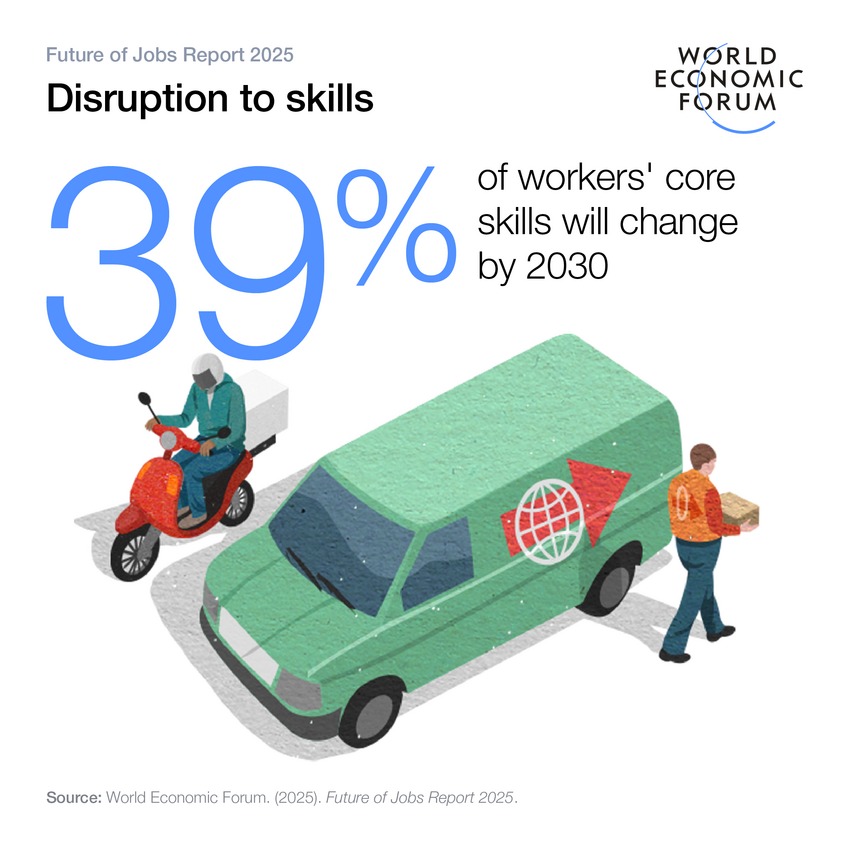
Source: World Economic Forum. Future of Jobs Report 2025.
The WEF finds that 39% of core skills will change by 2030 . Employers are responding by investing in training: 50% of workers are now involved in long-term learning programs, compared with 41% in 2023 .
The top five core skills for 2025–2030 are:
- Analytical Thinking (70% of employers)
- Resilience, Flexibility, Agility
- Leadership and Social Influence
- Creative Thinking
- Motivation and Self-Awareness
- Technological literacy
- Empathy and active listening
- Curiosity and Lifelong Learning
- Talent management
- Service Orientation and Customer Service
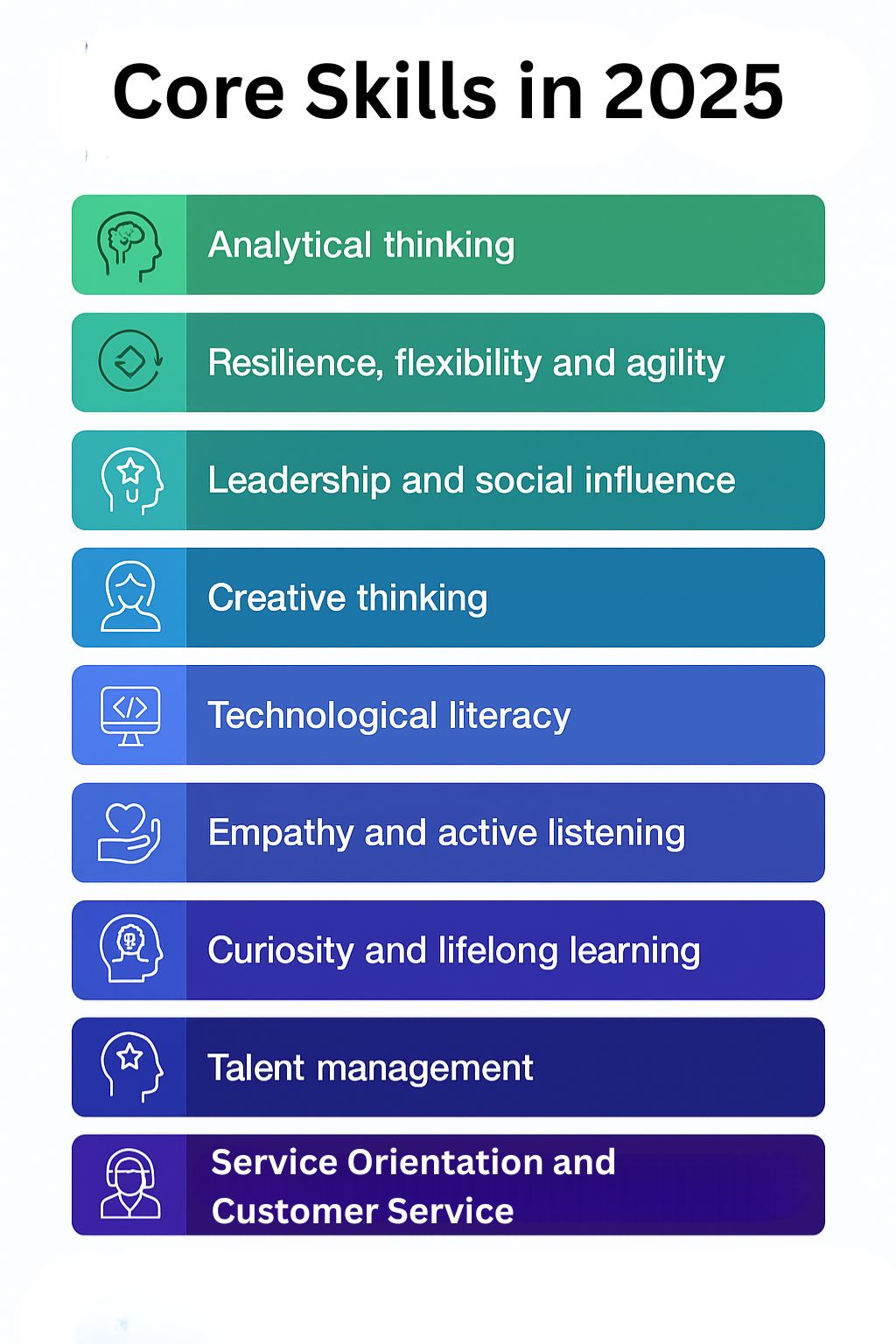
These emphasize that the future of jobs will require both human-centered abilities and technological literacy.
Fastest-Growing Skills
The most rapidly rising skills include :
- AI and Big Data
- Networks and Cybersecurity
- Technological Literacy
- Creative Thinking
- Analytical Problem-Solving
- Curiosity and Lifelong Learning
- Resilience, flexibility and agility
- Leadership and social influence
- Talent management
- Environmental stewardship
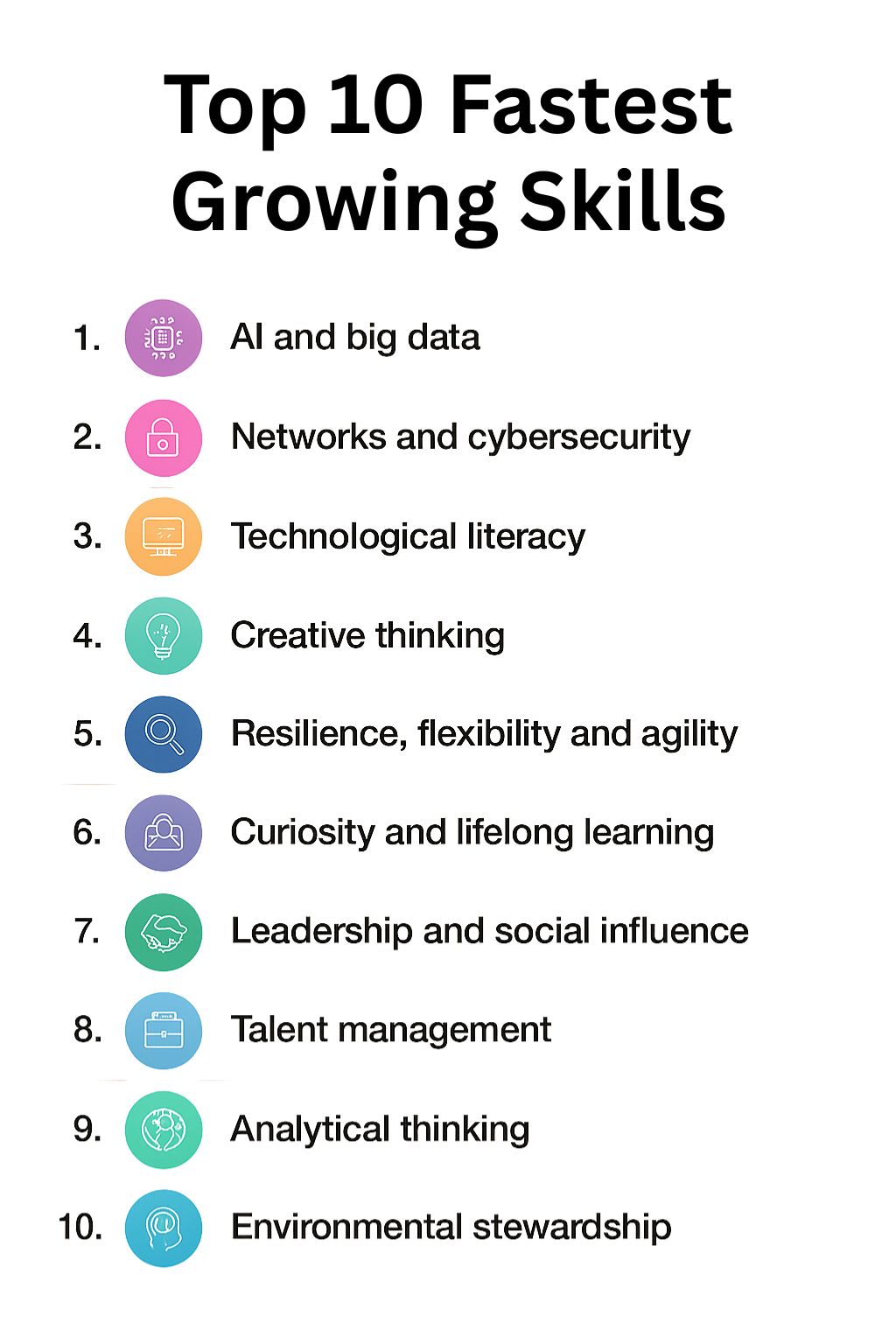
This blend of tech fluency and human adaptability underlines the importance of reskilling in today’s job market. Despite growth in green jobs, demand for workers with green skills still exceeds supply, underscoring the need for targeted training and reskilling initiatives.
Why Does the Job Market Change Over Time?
The job market evolves due to the interaction of multiple forces:
- Technology introduces new roles while replacing outdated ones.
- Demographics create demand for healthcare, education, and social services.
- Policy and environment shift investments toward renewable energy and sustainability.
- Economic cycles alter hiring demand in industries like construction, retail, and manufacturing.
This constant evolution means workers and employers must embrace adaptability as the new norm.
Recommendations for Workers and Employers
Recommendations for Workers
- Commit to Lifelong Learning – Join training programs or online courses to acquire new technical skills.
- Blend Skills – Combine technical know-how (AI, data analysis, cybersecurity) with soft skills (leadership, communication, creativity).
- Target Growth Industries – Explore opportunities in healthcare, education, green energy, and IT.
- Stay Agile – Be open to role transitions as industries evolve.
Recommendations for Employers
- Invest in Workforce Training – 85% of companies plan to reskill workers by 2030; strong programs help close skill gaps.
- Adopt Automation Strategically – Use technology to augment human work rather than replace it outright.
- Revamp Hiring Practices – With only 29% of firms expecting easier access to talent by 2030 , employers must explore new recruitment channels and diversity initiatives.
- Support Internal Mobility – Allow employees to move across roles and departments as industries shift.
By implementing these strategies, both workers and employers can thrive in the evolving job market.
Conclusion
The WEF Future of Jobs Report 2025 paints a clear picture: the job market is in constant transition, shaped by technology, demographics, and sustainability needs.
- New jobs are growing faster than old ones are disappearing, especially in technology, green energy, healthcare, and education.
- Skills matter more than ever—with analytical thinking, resilience, leadership, and technology literacy at the forefront.
- Adaptability is the key—workers must embrace lifelong learning, and employers must invest in strategic workforce transformation.
In short, the future job market will belong to those who adapt and upskill continuously. By combining human strengths with technological advancements, we can create a future of work that benefits businesses, workers, and society alike.
FAQs
1. What is the future of jobs?
The future of jobs is being shaped by rapid technological innovation, sustainability efforts, and demographic changes. While some traditional roles will decline due to automation, new opportunities will emerge in areas such as green energy, artificial intelligence, data science, cybersecurity, and healthcare. The focus will shift from routine tasks to jobs requiring creativity, problem-solving, and human–machine collaboration.
2. What is the future of work trends 2025?
The World Economic Forum’s Future of Jobs Report 2025 highlights major work trends, including:
- Growing adoption of automation and artificial intelligence.
- Expansion of green jobs due to the sustainability transition.
- Increased demand for digital skills across industries.
- More flexible work models, such as hybrid and remote work.
- Reskilling and upskilling as essential for career growth.
These trends suggest a more dynamic job market where adaptability and continuous learning are critical.
3. What is the Future of Jobs Report 2025?
The Future of Jobs Report 2025, published by the World Economic Forum (WEF), provides insights into how global labor markets are evolving. It surveys business leaders, HR experts, and industry executives to identify the skills, technologies, and sectors driving employment change. The report also forecasts which jobs will grow, which will decline, and what skills workers need to remain competitive.
4. How is technology shaping the future of jobs?
Technology is reshaping jobs by automating repetitive tasks while creating new roles in digital industries. Artificial intelligence, machine learning, robotics, and data analytics are expected to be widely adopted by 2030, leading to demand for tech specialists and digitally skilled workers. However, instead of replacing humans entirely, technology is driving human–machine collaboration, where both complement each other’s strengths.
5. What is the impact of the green transition on employment?
The green transition is significantly influencing job markets by creating new opportunities in renewable energy, electric mobility, sustainable agriculture, and resource efficiency. At the same time, traditional fossil-fuel-based industries are expected to decline. While millions of green jobs will be generated, there is also a green skills gap, meaning workers need reskilling to meet the demand for specialized roles in sustainability and climate-related sectors.
